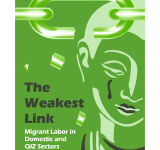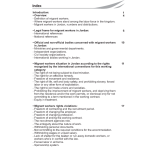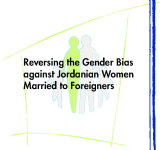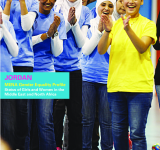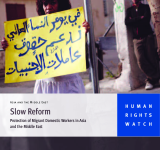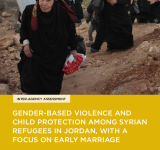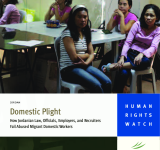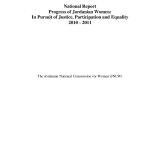domestic
The migrant worker in Jordan situation report was issued in 2009. It presents an overview of the situation of migrant workers in Jordan and the main violations they are subject to. Additionally;; the report offers recommendations to national and international parties concerned with the migrant workers' rights.
تهدف هذه الدراسة إلى الكشف عن التحديات التي تواجه النساء الأردنيات المتزوجات من رجال غير أردنيين وأبناءهن أيضاً. وتشمل الدراسة على تحلييل التكاليف والمنافع المترتبة على منح الإقامة والحقوق المدنية لهذه الفئة;; وذلك بهدف توفير صورة دقيقة لصانعي القرار لمعالجة غياب المساواة من وجهة نظر اقتصادية. وبشكل منفصل تسلط الدراسة الضوء على أثر حرمان أبناء تلك الأسر من هذه الحقوق;; وتحديداً ما يتعلق في شعورهم بالإنتماء. وكانت منهجية الدراسة مزيجاً من البحثين النوعي والكمي. وبلغ حجم العينة في المسح الكمي 230 رجل أردني متزوج من امرأة غير أردنية;; و210 امرأة أردنية متزوجة من رجل غير أردني في كل من: الزرقاء;; العقبة;; سحاب;; مادبا البلقاء.
This report is designed to trace the status of girls and women in Jordan. The main themes are: civic rights;; legal rights;; women political participation;; education;; participation in the labour market;; health;; reproductive health;; child protection;; domestic violence;; HIV/AIDS and treaties.
يراجع التقرير أوضاع ثماني دول فيها أعداد كبيرة من عاملات المنازل المهاجرات;; هي لبنان والأردن والسعودية والكويت والإمارات والبحرين وسنغافورة وماليزيا. يعرض التقرير التقدم المحرز في توفير تدابير الحماية المتوفرة بموجب قوانين العمل لعاملات المنازل;; وإصلاح نظم "الكفالة" الخاصة بالهجرة والتي تسهم في الإساءة للعاملات;; وضمان فعالية استجابة الشرطة والمحاكم على العنف البدني والجنسي;; والسماح للمجتمع المدني والنقابات بالتنظيم.
The report aims to address the particular needs and cultural dynamics of Syrian refugees residing in Jordan;; especially with regards gender-based violence and child protection issues. It presents a comprehensive range of perspectives from urban Syrian refugees and local Jordanian decision makers in government;; community-based organizations and the religious and education sectors. The assessment of this report is based on data collected through three methodologies including questionnaire survey to refugees outside the Za’atari refugee camp;; focus group discussions in regions across Jordan and in-depth interviews. Key findings of the report are 1. The rates of early marriage are high;; 2. A significant percentage of children contribute to the household’s income and 3. Restrictions on women and girls’ mobility constrain their participation in social and economic activities and access to basic services. The report recommends measures to prevent acts of sexual exploitation and abuse and ensure the needs of the most vulnerable members of the Syrian refugee population in the cities.
يوثّق التقرير الانتهاكات القائمة بحق عاملات المنازل;; وإخفاق المسؤولين الأردنيين في محاسبة أرباب العمل ومكاتب الاستقدام التي تستقدم العاملات. كما ينتقد التقرير قوانين الهجرة وقوانين العمل المنزلي التي تيسّر وقوع الانتهاكات;; من قبيل تحديد الإقامة قسراً في البيت وفرض غرامات على تجاوز مدد الإقامة القانونية;; حتى إن لم تكن العاملة هي السبب في التجاوز.
This national report is designed to trace the progress of women in various fields;; monitoring achievements;; and highlighting gaps and failures;; as well as analyzing indicators;; recommending measures;; and measuring levels of achievements in the implementation of plans and strategies. The main themes were selected according to national priorities dictated by each stage: Legal Protection for Women's Right to Access Justice;; Participation;; the Economic Empowerment of Jordanian Women;; Equality;; Citizenship and Decision-Making in Public Life. The conclusions of this report confirm that a much smaller effort was exerted at the level of providing information;; data and the provision of services in the area of providing justice and facilitating ways of achieving it. The lack of knowledge about available services among women;; whether provided by civil society organizations or government institutions;; affects women's ability to access justice negatively. Regarding the economic participation the Policies and plans that targeted empowering women economically show that the result of these policies was weak and limited. Difficulty of women’s access to job opportunities in the private sector and inequitable pay between the sexes;; lack of supporting services to working women;; including childcare Facilities;; poor matching between education outputs and skills required in the labor market and the traditional social standards that contribute to directing females towards certain professions. The report proposed general recommendations and directions that include quick solutions to deal with the main highlighted challenges.
